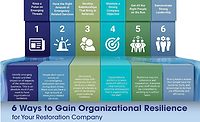Why You Need Systems in Place to Scale Your Business
Fixing the ownership paradox. Hint: You should be able to take a vacation!




What would happen if you took a week, a month or three months away from your business?
If you are currently imagining frustrated clients, lost income and maybe all-around chaos, this is a telltale sign your business is too dependent on you, the owner, to stay afloat. If you feel you are unable to step away, to devote your attention to your goals of scaling your business, then you are stuck in something called the ownership paradox.
Originally introduced by entrepreneur and author Scott Fritz in his book, The Forty Hour Work Year, the ownership paradox is the idea that a company that is heavily reliant on their owner’s involvement in day-to-day operations is a company whose value will always be limited. It makes sense, when you really think about it, no matter how productive or organized you are or how devoted you are to growing your business, you are still a human with limitations. You can’t take complete responsibility for your organization’s success and scale your business at the same time.
So what’s the solution? It’s simple, really. Putting systems in place so your business can run seamlessly without you is the only option for entrepreneurs who want to see their business grow.
Are You Building an Asset? Or Just Self-Employed?
Think back to when you first began your adventure as the owner of a restoration business. What was your initial goal? Did you simply want to be self-employed or were you hoping to build an asset that would grow over time?
Being your own boss may have been the driving force behind your decision, but we’ve got a feeling you wouldn’t be here, devoting your precious time to learning everything there is to know about restoration and entrepreneurship, if you didn’t want more.
Perhaps you want to expand or sell your organization in the future. Scaling your organization can only happen if you are open to change, if you are willing to loosen your grip and let the employees and business you have worked so hard to build run on their own. Systems are the solution to the limitations you currently face. Systems will be essential to the worth of your business if you choose to sell because these methods and procedures will continue to run on autopilot after you step away.
The Role & Importance of Systems
We keep talking about systems, but maybe we should take a moment to clarify what exactly this word means for the small business owner. A system is a documented procedure, method or process for the day-to-day operations of your business.
Breaking it down even further, systems are built of subsystems. How your company manages things like how the phone is answered or how leads are documented and tracked may be small details, but they play a big role in the successful operation of your organization.
How do you know if you need to implement systems? In our opinion, this isn’t the question you should be asking. The truth is, every business needs systems in order to run smoothly.
Here are a few signs you need to buckle down and turn your business into a system-run, not ownership-run, machine:
- You show up to the company you own every day, even if you are a sick, and you have been too afraid to take so much as a weekend trip with your family since your company’s birth.
- The same details are getting missed or falling through the cracks over and over again.
- You have big goals for the future of your business, but you continue to push them to the side because you don’t have time to pursue the growth of your company.
- You are always working IN the business, but not ON the business
Systems Every Restoration Company Needs
The systems you implement in your business may vary based on your company’s needs. The size of your business and the scope of the restoration services you offer may require you to create your own systems or at least customize them to your needs. Even so, there are some systems that are simply non-negotiable for any restoration business.
For instance, referral marketing is essential to your company’s financial success and without referral marketing systems, we promise you aren’t capturing every potential lead that comes your way. We work in an emergency business. In our industry, homeowners don’t plan for a fire or a flood; they hope it is never something they have to think about. Given that the average home only floods once every 50 or more years, your potential clients are not going to keep your business card on the fridge or your number in their phone. They’re going to hear about you from their first call after disaster strikes—most likely to their plumber or their insurance agent. Because of this, every restoration company must have systems in place for managing their referral marketing.
Building a Strong Team
Your company is only as successful as the strength of the team you build. Building a strong team can be a painstaking process, or it can be managed by a set of subsystems that make sure applicants are being properly vetted, orientation is thorough and continuing training is happening all year long. Systems are a continual process, allowing you to always ‘inspect what you expect.’
Get Paid!
Lastly, every restoration company must have a system for making sure they are getting paid and they are getting paid on time. From the very estimate, to invoicing and payment, to following up on late accounts, systems will be your saving grace during lean months when every dollar counts as well as during busy months when no one has the time to triple check that money isn’t getting left behind.
First Step to Implementing Systems
Taking the first step to implement systems in your business can feel daunting, especially if you have grown accustomed to running the day-to-day operations. We know because we did it ourselves many years ago. At More Floods, we work with independent restoration companies to implement the tried and true operational systems and marketing methods we have been evolving for decades. We’re happy to share some free, practical tips and insights with our recent white paper, The importance of Systems to Scale your Company, you can download it at www.iwantmorefloods.com.
Looking for a reprint of this article?
From high-res PDFs to custom plaques, order your copy today!









